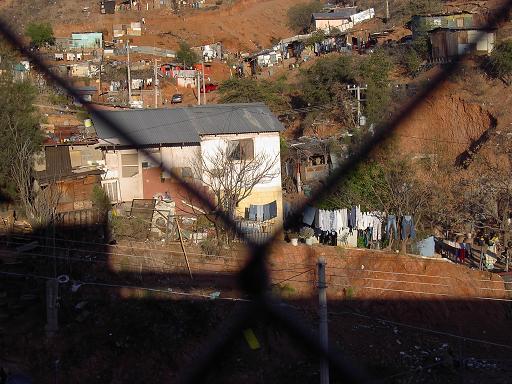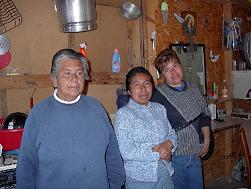| Return to Home page |

The trip to Nogales was intellectually
compelling. I am a global business major who believes free trade is
best for the economic global majority. That belief has been challenged,
however. I am now torn between the pros of globalization on the world’s
economy, as well as the cons of globalization on the people. The
enormous number of people who wish to migrate from Mexico is an
alarming indicator that globalization has a negative impact on the
indigenous population.
Multi-national or globally operated firms begin production in foreign
countries to reduce the cost of production, which reduces the cost of
the product, so people who were previously unable to afford these
products, are now able to. Another benefit to producing goods in
foreign countries, according to business studies, is in creating new
jobs. The economy is stimulated in less- and under-developed
countries. Consequently these countries will gain economic advantages
and regain the ability to support their citizens. In theory and without
other perspectives, this cycle is logical and believable. Yet, the
notion that foreign investment would significantly contribute to
foreign economies, increase the standards of living, leading to a
decrease in migration, is simply not happening.
One industry that we clearly see this exemplified is in the
agricultural business. Why Migration, by Saskia Sassen, posits that
foreign investment actually forces migration. Indigenous agricultural
and manufacturing enterprises are displaced in significant numbers; in
turn, displacing people from their homes and lifestyles. Thus,
migration is increasing instead of decreasing as a result of
globalization. In speaking with social activists in Nogales, U.S. based
companies like Del Monte have not only driven the native farmers out of
business but are exporting the goods as well as the profits back to
their homeland (the U.S.A.). This leaves Mexico with no resource—the
land, for stimulating the economy and no capital—leaving people no
choice but to work for low wages.
Without the option of farming their own land to either sustain their
families or generate income, the indigenous people are displaced in
search of meeting the fundamental needs of their families. The
maquiladora industries (foreign-owned assembly plants), primarily owned
by U.S. firms, is right there willing to offer them a job. To the
uninformed, these jobs may seem like a civilized answer; however, there
are a number of problems involved with these foreign-owned companies.
In Maria Guadalupe Torres’s article, We Are Not Machines: Corporations
that Bring Jobs Must Bring Justice Too, she explains that workers
became organized and demanded improvements be made in the maquila
factories. In the beginning, the working conditions were substandard.
Many workers were forced to work with hazardous materials, in unclean
and unsafe situations causing numerous health conditions. These health
problems were not limited to the workers; their babies were being born
with defects as well. There were also environmental problems to be
dealt with. Chemicals needed to be disposed of properly, water needed
to be treated, and sewage services put in place. Through the dedication
of many determined people, these hurdles have been dealt with
(unfortunately, to a minimal extent). There are still ongoing
environmental, health, and safety issues that effect not only the
Mexican side of the border, but the U.S. as well.
In our tour of a first-rate maquila, Otis, we were able to see that the
working conditions were top-notch. The environment was incredibly
clean, spacious, and from the statistics posted in the plant, a very
safe place to work. The company offers medical benefits to the workers
and their families, three daily meals for the small price of $4.00 per
week, and in addition to the $9.00 per day (minimum) they supplement
their income with an equivalent of U.S. food stamps. Another benefit
Otis offers is an education scholarship. Any worker can attend college
taking one or more classes at a time and receive full payment of school
and books (as long as they maintain an 80% grade average or better),
with no obligation to the company for future employment. The perks
sound great, but the fact remains $9.00 a day cannot sustain a family.
Unfortunately, the problem of low wages paid by foreign-owned companies
will continue to be a problem with no foreseeable answer. The problem
of low wages is two-fold. If the Mexican government raises the minimum
wage, the global companies will relocate their business to a more
cost-effective country. Thus, Mexico will have an increased
unemployment and poverty rate; increasing migration from Mexico even
further. If the U.S. increases the amount of legalized immigrants from
Mexico, the many companies that now employ migrant workers (at below
minimum wage), would have to pay higher wages. The cost of products
made in the U.S. would then increase (driving even more companies to
foreign lands for cheaper labor). In turn, unemployment and poverty
would increase in Mexico and the U.S. 
In speaking with the three “squatter” ladies that we had lunch with in
the colonias in Nogales, they want to stay where they are. When asked
if they would like to migrate to the U.S. for a better life, their
answers were an resounding “No”. Nogales offers them a better life than
where they came from, elsewhere in Mexico. They feel their life in
Nogales is a happy and comfortable one. The stories they hear of
immigrants to the U.S. is that the demands of work and living expenses
consumes their lives, leaving them no “happy times”.
The global economy is a conundrum. Globalization is not all good, but
not all bad. Immigration restrictions and laws are not all good, but
not all bad. It is a sad fact that 1,000 people a day risk their lives
to illegally cross the border from Mexico to the U.S. in hopes of a
better life. We hear the stories of those who have crossed and become
successful, we hear the horror of those who never made it and who will
never return. Regardless of the country of residence, legal or illegal,
the story of an immigrant is a story of struggle.
|


